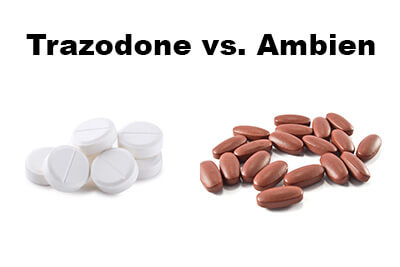Trazodone Vs. Ambien: Uses, Side Effects, and Comparison

The term insomnia is a descriptive word as opposed to a formal medical term that is used to describe problems with sleep. Insomnia can be used to describe difficulty falling asleep, waking up during the night at some point and being unable to go back to sleep, and significant issues with fatigue and sleepiness after waking.
There are two primary divisions of insomnia.
- A person who has difficulty with sleep that is not caused by some other psychological or physical disorder would be categorized as having primary insomnia
- A person who has difficulty sleeping due to a medical condition or mental health disorder would be diagnosed with secondary insomnia.
The treatment for primary insomnia is simply to address the sleep issue, whereas the treatment for secondary insomnia would involve addressing the condition that is producing the insomnia and perhaps addressing the insomnia itself medically or behaviorally. Most people suffer from temporary insomnia at some point in their lives, and issues with temporary insomnia that resolve over time are usually not problematic.
Chronic insomnia is defined as insomnia that occurs at least three times a week and has been consistently occurring at least one month.
There are numerous medications designed to address issues with insomnia. Two of the more popular medications are Ambien (zolpidem) and Desyrel or Oleptro (trazodone).
Ambien: What Is It?
Ambien is a sedative or hypnotic (sleep-producing) drug that is prescribed primarily for the treatment of insomnia. Ambien has a mechanism of action that is similar to the mechanism of action of more potent tranquilizers/sedatives like benzodiazepines (e.g., Xanax or Valium).
Ambien is believed to work by increasing the availability of the primary inhibitory neurotransmitter in the brain and spinal cord GABA (gamma-aminobutyric acid). This neurotransmitter is a chemical that is released by the neurons in the brain and spinal cord (referred to as the central nervous system) that reduces the actions of other neurons in the brain. This leads to its ability to produce sedation.
Ambien works relatively quickly compared to many similar drugs, and it has a very short half-life (the time it takes the system to metabolize or reduce the concentration of a drug to half its original concentration). This means that Ambien works quickly, does not remain in the body very long, and can help to induce sleep with lower doses than similar drugs (e.g., benzodiazepines like Xanax). When individuals experience the type of insomnia that does not involve problems falling asleep, but instead involves waking up in the middle of the night and not being able to go back to sleep, higher doses of Ambien or an extended-release version may be used.
Trazodone: What Is It?
Trazodone is not a medication that is primarily designed to produce sleep (a sedative or hypnotic medication). Trazodone was developed as an antidepressant medication. It has an entirely different mechanism of action than Ambien.
Trazodone works by increasing the availability of the neurotransmitter serotonin in the CNS. It is categorized as a serotonin antagonist reuptake inhibitor (SARI), meaning that it primarily blocks the ability of neurons to reabsorb serotonin once it has been released into the central nervous system. This leaves serotonin available in the central nervous system for longer periods of time and theoretically addresses issues with depression.
Because of the chemical composition of trazodone, it has been found to have mild sedating effects, and it is less effective than other antidepressants for the treatment of depression. Therefore, trazodone has found greater utility as a sleep aid than it has as an antidepressant medication.
Comparing Side Effects: Ambien vs Trazodone
Side Effects of Ambien
- Lethargy, drowsiness, and daytime sleepiness (particularly in elderly people)
- Dizziness, lightheadedness, and/or headache
- Nausea and diarrhea
- Problems with reaction times and coordination
- Problems with remembering new information, particularly the day after using the drug
- Rebound insomnia (insomnia that occurs when the person stops using the drug)
- Hallucinations (rare)
- Parasomnias (very rare), which are troubling disorders of sleep that occur when a person who is sound asleep begins engaging in activities that they would normally perform while they are awake, such as cooking, doing household chores, and even driving
- The development of physical dependence on Ambien (tolerance and withdrawal symptoms)
Side Effects of Trazodone
- Nausea, vomiting, and diarrhea or constipation
- Dizziness, unsteadiness, dry mouth, and/or headache
- Fatigue, tingling or numbness in the extremities (arms and legs), or ringing in the ears
- Muscle pain, rash, tremors or shaking (mostly in the hands)
- Anxiety, difficulty with attention, decreased appetite, and weight loss
- Prolonged and painful erections in men
- Thoughts of harming oneself (most often in children or adolescents)
- Mild physical dependence
Both drugs have the risk for very rare and more serious side effects that would need to be addressed by a physician if they occur. Higher doses are more likely to produce more severe side effects. Trazodone is generally better tolerated in most people than Ambien because trazodone is not specifically designed to produce sedation. However, the actual side effects than any person will experience are difficult to predict, and physicians typically wait and see how the person reacts to the drug.
A Brief Comparison of Trazodone and Ambien as Sleep Aids
Ambien as a sleep aid:
- Is effective at helping people fall asleep quicker and stay asleep longer.
- Comes in an extended-release version that is effective at helping people stay asleep.
- Comes in generic versions (zolpidem) that are inexpensive.
There are some downsides to Ambien.
- It may produce next-day drowsiness or cognitive problems.
- People develop tolerance to Ambien quickly, meaning they need more of the drug over time for it to be effective.
- It has the potential to produce parasomnias.
- It is not indicated for people with a history of depression, respiratory problems, kidney disorders, or liver problems.
- It is very likely to produce physical dependence.
Trazodone for sleep as a sleep aid:
- Is commonly used to treat issues with sleep at lower doses.
- Is safer for elderly individuals than other sleep aids.
- Has fewer side effects than most drugs used as sleep aids.
- Does come in a generic version that is cheaper than Ambien.
There are some downsides to trazodone.
- If depression is the issue, higher doses are needed.
- Higher doses result in more side effects.
- Problems with sexual functioning (particularly males) and suicidality (particularly in younger people).
- It is less sedating than Ambien and may not be effective for everyone.
[/callout]
Physical Dependence

Both Ambien and trazodone use may produce a syndrome of physical dependence (withdrawal symptoms when the person cuts down on using the drug or stops using it altogether). The symptoms of withdrawal associated with Ambien include insomnia, anxiety, flulike symptoms, and stiffness or muscle cramps. The symptoms associated with antidepressant discontinuation syndrome (withdrawal from antidepressants like trazodone) include anxiety, depression, irritability, and mild flulike symptoms.
In general, both withdrawal syndromes are addressed by slowly tapering down the dosage of the drug over time to allow the system to get used to decreasing amounts and then finally discontinuing it altogether. The withdrawal syndrome associated with Ambien is considered to be more severe and more potentially serious than withdrawal from antidepressants like trazodone. Likewise, the potential to develop a withdrawal syndrome is higher with Ambien than it is with trazodone.
Which Is Best?
The data indicates that trazodone will most likely produce fewer side effects and complications than Ambien; however, trazodone may not help some individuals with sleeping. The choice of using trazodone or Ambien is really dependent on the particular needs of the person being treated, their medical history, and the other medications they are taking.
That being said, using medications to treat insomnia is not considered to be the best overall choice. Instead, using Cognitive Behavioral Therapy to help people sleep is a better long-term solution than the use of any medication. For instance, an article in TIME compared the effects of medications and psychotherapy, and came to the conclusion that Cognitive Behavioral Therapy is the best long-term solution to insomnia.
Thus, medications like Ambien, trazodone, and even natural substances like melatonin should only be used as temporary aids for sleep while an individual attempts to address the primary problem that is producing their sleep difficulties. Using behavioral techniques allow the person to address their issue, develop a program of healthy sleep, and continue to implement this program over the long-term without experiencing significant side effects.

